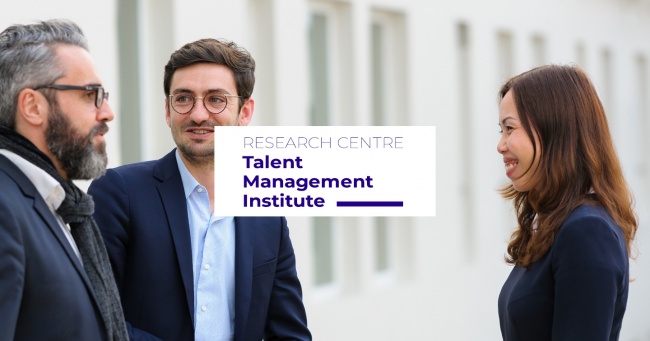Research Centre
Talent Management Institute
Talent management has become the #1 priority for executives, because of demographic changes (an aging population, a more diversified workforce), the continued global war for talent and new types of employee relationships that present new challenges and obstacles for companies of all sizes (e.g. “Arbeitswelten 4.0”).
We are a group of researchers and experts with practical experience in the area of talent management. We are passionate about human resources and attracting, identifying, developing and retaining talent. Through this institute we offer our independent expertise and knowledge to practitioners and academics alike: We support companies in the war for talent by providing state-of-the-art talent management (TM) research and creating a community of TM experts for knowledge sharing.
Marion Festing
Professor of Human Resource Management and Intercultural Leadership
Mission/Objectives
The twin goals of the Talent Management Institute are:
- To deepen the understanding of talent management in various contexts, including small- and medium-size companies and multinational corporations, traditional and new forms of work, as well as country-specific institutional and cultural influences
- To translate the latest scientific insights into practice
Our Excellence Centre focuses on three specific research questions:
- First, how can particularities of talent management be described, explained, and effectively applied in different types of organizations, such as small- and medium-size enterprises, family businesses and multinational organizations?
- Second, what trajectories exist or can be envisioned in the context of a more complex and dynamic environment?
- And finally, how can we consider diversity and inclusion in talent management?
Academic research on these questions can only be a first step. We further aim to translate the resulting insights from our research into practice. Therefore, we regularly engage with companies across the world in order to collect more data, discuss our findings and support them in further developing their talent management agenda. This entails keynote presentations, webinars as well as training and consulting measures.
Main Research Themes
Talent Management in dynamic environments
Ambidextrous talent management represents a fresh view on talent and talent management (TM) and suggests novel TM practices.
The highly unpredictable, complex, and dynamic business environment forces companies to innovate constantly. One organizational response to coping with environmental pressures is organizational ambidexterity, i.e. the ability to pursue simultaneously the exploitation of existing capabilities and the exploration of new opportunities. It has an impact on the way of working, and consequently organizations need to re-evaluate their talent strategies.
We investigate a fresh view on talent and talent management (TM) by suggesting an ambidextrous talent-management approach, including novel TM practices that have been rather neglected in the so far dominant traditional TM approach. Implications for organizational agility will be discussed.
New talent management practices – talent sharing
Talent development through talent sharing is a novel approach that fosters individual and organizational learning as a response to dynamic business environments.
The fast-changing challenges of the modern economy, arising from new technologies, global competition, changing customer and market demands, force organizations to innovate at a tremendous pace.
In order to confront these challenges, recent research has indicated the importance of internal and external networks. They allow for fast and flexible learning, knowledge sharing, accessing new markets and incorporating novel tacit knowledge sourced within and beyond organizational boundaries. In this context the organization's talents are considered as a lynchpin because their in-demand experiences and knowledge foster network building and maintaining. These social ties – namely, social capital – in turn enable them to contribute to value creation.
Taking this into account, organizations are increasingly urged to reconsider and redesign the ways in which they manage talent. As part of such a redesigned TM system the practice of ‘Talent Sharing’ has recently emerged. We investigate this experience-based approach to talent development with respect to its potential to shape key employees with the help of inter-organizational talent transfers between co-operation partners or competitors for a fixed time period. This allows for an external perspective, inter-organizational learning and knowledge exchange across organizational boundaries.
Inclusive talent management
Talent has often been represented in a homogenous group of white males. The inclusive TM approach aims to ensure the consideration of diverse talent.
This research contributes to our knowledge on talent management (TM) by conceptually and empirically investigating the peculiarities of TM and gender inclusion in talent development.
We also analyze whether TM is an inclusive HRM practice with respect to gender. Thus, we add an interdisciplinary perspective to the study of TM by linking it to important findings of gender and HRM studies with a specific focus on inclusion. Further, we take the example of talent management (TM) and combine conceptual and empirical insights into gender inclusion (think talent, think male), in order to derive implications for other diversity dimensions.
While people who differ from the White male ideal of a manager (e.g., a female or a talent of another culture) are more likely to be excluded from decision-making in TM processes, they are also less likely to be identified and developed within an organization. As a result, a grid and resulting indicators for inclusive TM will be proposed, including implications for practice and future research.
Governance
Marion Festing
Professor of Human Resource Management and Intercultural Leadership

